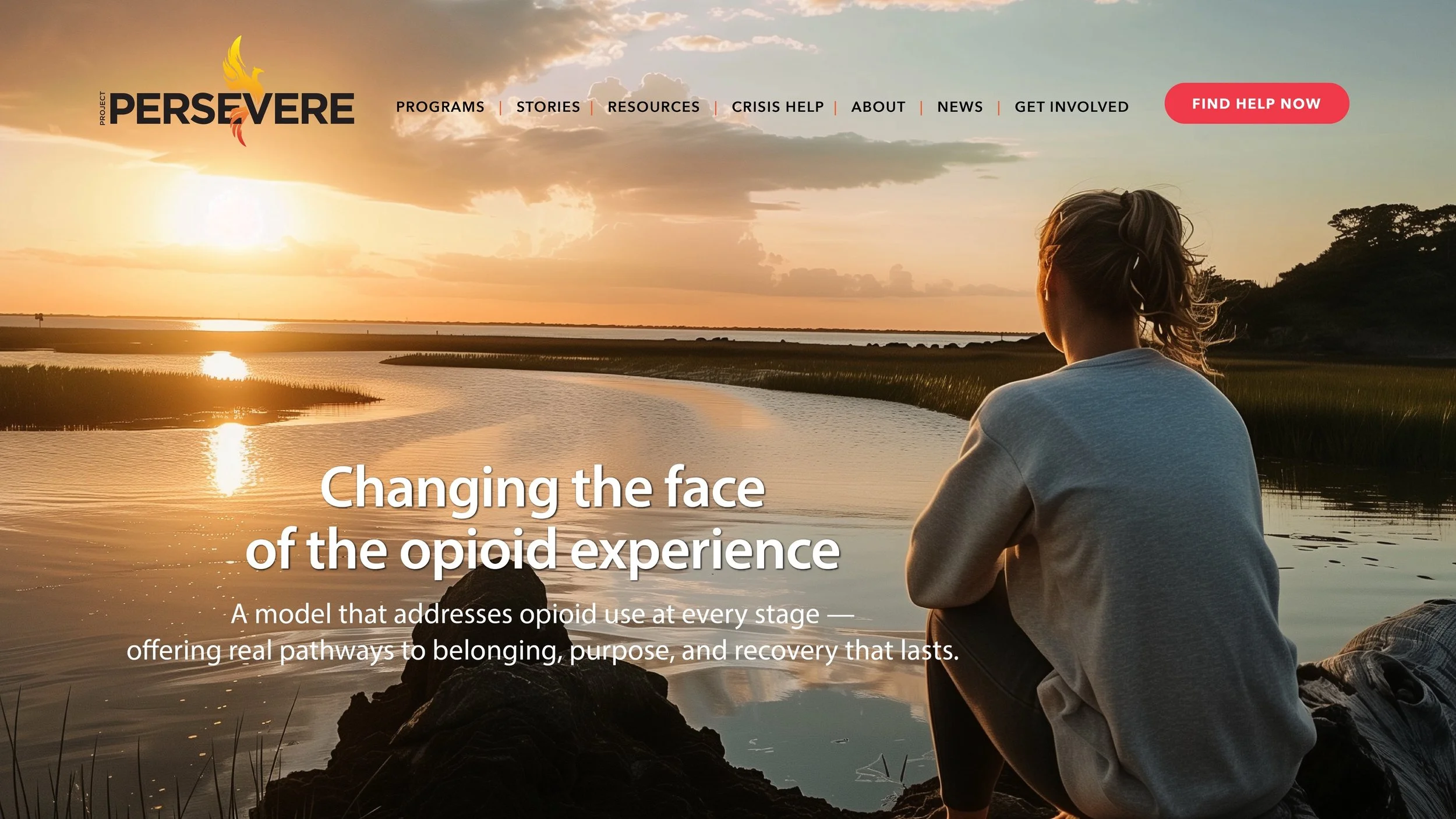Helios Alliance Announces Project Persevere to Combat Opioid Crisis in Mobile, Alabama
Multi-Jurisdictional Initiative Aims to "Change the Face of the Opioid Experience" Through Evidence-Based, Community-Centered Approach
The Helios Alliance, in partnership with the City of Mobile and Mobile County, recently unveiled Project Persevere, a comprehensive communications campaign aimed at reducing the stigma surrounding opioid use disorder and increasing awareness of local recovery resources. The initiative represents a pioneering "bottom-up" approach that puts those with lived experience at the center of the solution, while establishing a potential model for statewide implementation.
Mobile Mayor Sandy Stimpson said the City of Mobile is proud to support the 16 local organizations whose work is at the heart of Project Persevere. “The opioid crisis has touched every part of our community and demands a response that is just as comprehensive. Through Project Persevere, these 16 organizations are building real pathways to recovery for our community and the many Mobilians directly impacted by opioid abuse and addiction. We appreciate the continued partnership of the Helios Alliance, the Mobile County Commission, and all of the organizations working to address this crisis across our community.”
The campaign, operating under the tagline "Changing the face of the opioid experience - A model that addresses opioid use at every stage — offering real pathways to belonging, purpose, and recovery that lasts," will coordinate efforts among 16 local organizations receiving opioid abatement funding to create a comprehensive network of prevention, treatment, and recovery services.
"Project Persevere represents a fundamental shift from traditional top-down approaches to addressing the opioid crisis," said Caroline Etherton, Chair of the Helios Alliance. "By centering our efforts on those with lived experience and building authentic community partnerships, we are creating sustainable pathways to recovery that address the whole person, not just the addiction. This is about belonging, purpose, and recovery that truly lasts."
The announcement drew support from multiple levels of government, signaling potential for broader implementation across Alabama. Mobile County has formally committed to supporting the initiative, with discussions currently underway for potential regional expansion.
"This evidence-based, data-driven approach is exactly what we need to see replicated across Alabama," said Alabama Representative Frances Holk-Jones. "Mobile's model demonstrates how communities can take ownership of this crisis and create real solutions. From a legislative perspective, this type of comprehensive, community-centered approach provides the measurable outcomes we need to inform state policy and funding decisions."
Mobile County Commission President Merceria Ludgood emphasized the importance of multi-jurisdictional collaboration: “The opioid crisis knows no boundaries, and neither should our local response. Mobile County Commission is proud to support both Mobile United’s school-based initiative and Project Persevere. These investments of opioid settlement funds in prevention, education, and community-driven solutions should help save lives and strengthen families.”
These comments echo Alabama Attorney General Steve Marshall’s remarks made last Fall at the Coastal Alabama Opioid Abatement Summit: “We have an opportunity, generationally, to make a difference in our state. And, I truly believe it is a result of the leadership in this community - Mobile is going to lead the charge for how this can be done effectively.”
Addressing a Critical Need
While opioid deaths are down across Alabama, Mobile County continues to significantly exceed the national average of opioid prescriptions per capita by 130%. Alabama ranks among the highest nationally for opioid prescribing rates, making comprehensive community-based interventions essential.
Rayford Etherton of the Helios Alliance outlined the campaign's comprehensive scope.
"Project Persevere isn't just another awareness campaign," he said. "We're coordinating 16 organizations that address every stage of opioid use — from prevention programs in schools to long-term recovery housing, from maternal and infant care to specialized veterans' services. This creates a true continuum of care that meets people wherever they are in their journey."
Decades of research show that connection and community are the opposite of addiction, Etherton said. "Project Persevere understands this fundamental truth — that recovery happens in relationship, in community, when people feel they belong and have purpose."
Attendees at the July 30, 2025 launch of Project Persevere
Comprehensive Community Network
The 16 organizations funded by the City of Mobile opioid grant program represent a diverse array of services addressing every aspect of the opioid crisis:
Prevention and Early Intervention:
Boys and Girls Club of South Alabama (youth prevention programming)
Mobile United (peer-to-peer prevention in schools)
INTO LIGHT Project (stigma reduction through art and storytelling)
Treatment and Recovery Services:
Franklin Primary Health Clinic (comprehensive treatment and outreach)
Mobile Metro Treatment Center (medication-assisted treatment with transportation support)
USA Children’s and Women's Hospital (specialized maternal and infant care)
Family Counseling Center/Lifelines Counseling Services (wraparound family services)
Housing and Long-Term Recovery:
Door to Serenity (recovery housing and comprehensive support)
Home of Grace for Women (faith-based long-term recovery)
The Lovelady Center (comprehensive women's recovery programming)
Waterfront Rescue Mission (recovery readiness and support services)
Specialized Populations:
Mobile County Veterans Treatment Court (justice-involved veterans)
Mobile Community Corrections Center/Mobile Adult Drug Court (alternative sentencing)
Mobile Area Interfaith Conference/The Neighbor Center (reentry services)
Innovation and Prevention:
Goldfinch Health (surgical opioid reduction through evidence-based protocols)
Yosemite Consulting & Wellborn Strategies (communication & coordination)
"What makes this initiative unique is that it's not imposing solutions from the outside," said Valarie McKinley, Executive Director of Home of Grace for Women, representing the grantee organizations. "These are community organizations that have been doing this work for years, often with limited resources. Project Persevere amplifies our efforts and connects us in ways that create a true safety net for anyone struggling with opioid use disorder."
Evidence-Based Approach with Statewide Potential
The campaign emphasizes measurable outcomes and data-driven strategies, making it an attractive model for potential statewide scaling. By focusing on reducing stigma and increasing resource awareness, Project Persevere addresses two of the most significant barriers to recovery: shame and lack of knowledge about available help.
The initiative also includes plans for comprehensive evaluation and measurement, ensuring that lessons learned can be documented and shared with other communities facing similar challenges.
Looking Forward
Project Persevere will launch its public-facing campaign in the coming months, with coordinated messaging across digital, traditional, and community-based platforms. The effort will highlight real stories of recovery and resilience while connecting individuals and families to comprehensive local resources.
"This is just the beginning," Caroline Etherton concluded. "Project Persevere is designed to evolve and improve based on what we learn. Our goal is not just to address the opioid crisis in Mobile, but to create a replicable model that can help communities across Alabama and beyond save lives and rebuild families."



